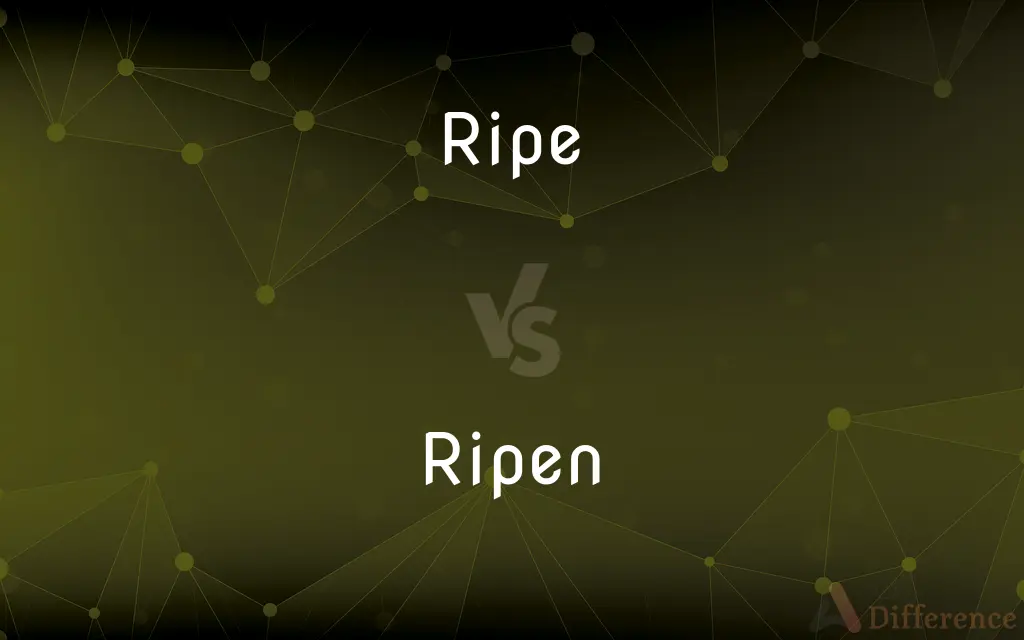Ripe vs. Ripen — What's the Difference?
By Maham Liaqat & Urooj Arif — Updated on March 4, 2024
Ripe refers to the condition of being fully grown and ready to eat, emphasizing a state of maturity in fruits or other entities, while ripen is a verb that describes the process of becoming ripe, focusing on the transition towards that state of maturity.

Difference Between Ripe and Ripen
Table of Contents
ADVERTISEMENT
Key Differences
Ripe is an adjective that denotes a specific stage of growth or development, particularly in fruits and vegetables, where they have reached full maturity and are at their peak for consumption. This stage is characterized by optimal flavor, texture, and nutritional value. On the other hand, ripen is the process through which fruits, vegetables, or other entities undergo changes to reach the ripe stage. This process can be influenced by various factors, including time, temperature, and environmental conditions, and it involves a series of physiological changes.
While ripe indicates a static condition a point of readiness or peak condition ripen is dynamic, highlighting the journey or transformation from an immature to a mature state. The concept of ripeness is not just limited to food; it can metaphorically apply to ideas or time, suggesting readiness or opportune moments. Conversely, ripening is always a process, implying progression towards readiness.
The assessment of ripeness is critical in agriculture, culinary arts, and nutrition, as it affects the taste, texture, and overall appeal of food. Ripening, then, is a key focus of these fields, with techniques developed to either hasten or delay it, depending on the desired outcome. For instance, some fruits are picked before they are ripe and allowed to ripen during transportation or storage.
The distinction between ripe and ripen also reflects in their application beyond the literal sense. Ripe can describe situations or opportunities that are ready or favorable for a particular action, while ripen could be used to describe the development or improvement of conditions over time until they reach such a favorable state.
Comparison Chart
Part of Speech
Adjective
Verb
ADVERTISEMENT
Definition
Being in a state of full maturity, ready for consumption or use
The process of becoming mature or bringing to maturity
Focus
End state or condition
Transition or process towards an end state
Application
Used to describe fruits, vegetables, and metaphorically, opportunities
Used to describe the process affecting fruits, vegetables, and metaphorically, conditions
Characteristics
Optimal flavor, texture, and readiness
Involves changes in color, texture, and chemical composition
Usage
Indicates readiness or peak condition
Indicates progression towards readiness
Compare with Definitions
Ripe
Fully grown and ready to eat.
The tomatoes in the garden are ripe and ready for harvest.
Ripen
To become ripe.
We left the bananas on the counter to ripen.
Ripe
Most favorable or suitable.
The time is ripe for investing in renewable energy.
Ripen
To make or allow to become ripe.
The winemaker ripens the grapes to perfection.
Ripe
Fully developed.
His time in training had made him ripe for the competition.
Ripen
To develop to a point of readiness or maturity.
His skills ripened after years of practice.
Ripe
Mature or advanced in age.
She was of ripe old age when she finally retired.
Ripen
To bring to a condition of readiness or perfection.
The plan ripened after months of discussion.
Ripe
Rich or well-developed in qualities.
The novel was ripe with vivid imagery and complex characters.
Ripen
To undergo change towards a mature state.
The cheese ripens in a controlled environment.
Ripe
Fully developed; mature
Ripe peaches.
Ripen
To make or become ripe or riper; mature.
Ripe
Sufficiently advanced in preparation or aging to be used or eaten
Ripe cheese.
Ripen
(intransitive) to grow ripe; to become mature (said of grain, fruit, flowers etc.)
Grapes ripen in the sun.
Ripe
Ready for reaping or gathering; having attained perfection; mature; - said of fruits, seeds, etc.; as, ripe grain.
So mayst thou live, till, like ripe fruit, thou dropInto thy mother's lap.
Ripen
To cause to mature; to make ripe; as, the warm days ripened the corn.
Ripe
Most suitable or right for a particular purpose;
A good time to plant tomatoes
The right time to act
The time is ripe for great sociological changes
Ripen
Cause to ripen or develop fully;
The sun ripens the fruit
Age matures a good wine
Ripen
Grow ripe;
The plums ripen in July
Common Curiosities
How do you know when a fruit is ripe?
A fruit's ripeness can be determined by its color, texture, aroma, and sometimes the ease with which it can be detached from the plant.
Is it possible to hasten the ripening process?
Yes, the ripening process can be hastened by storing fruits at certain temperatures, using ethylene gas, or placing them near other ripe fruits.
Can ripening be reversed or stopped?
Once ripening begins, it cannot be reversed, but it can be slowed down by refrigeration or controlled atmosphere storage to extend freshness.
Do vegetables also ripen?
Yes, vegetables also ripen, undergoing processes that enhance their flavor, texture, and nutritional content, though we often use the term more with fruits.
Can all fruits ripen after being picked?
Not all fruits ripen after being picked; some, like berries, do not continue to ripen once harvested, while others, like bananas, ripen post-harvest.
How does ripening affect the taste of fruit?
Ripening affects the taste of fruit by increasing sweetness, reducing bitterness or astringency, and developing the fruit's characteristic flavors.
Can ripening affect the nutritional value of fruit?
Yes, ripening can affect the nutritional value, often increasing levels of certain vitamins and antioxidants as the fruit matures.
What does it mean when fruit is ripe?
When fruit is ripe, it means it has reached full maturity, making it ready for consumption with optimal taste, texture, and nutritional value.
What does "ripe for the picking" mean?
"Ripe for the picking" is a metaphorical expression meaning something is in an optimal or mature state and ready to be taken advantage of or utilized.
How does the environment affect ripening?
The environment, including temperature, humidity, and exposure to ethylene gas, significantly affects the rate and quality of ripening.
Is it better to eat fruits ripe or unripe?
Generally, eating fruits when they are ripe is better, as they have a more pleasant taste and higher nutritional value, though preferences and specific uses may vary.
How can ripening influence food preparation?
Ripening influences food preparation by determining the flavor, texture, and overall suitability of fruits and vegetables for various dishes, affecting cooking times and methods.
What's the difference between ripening and rotting?
Ripening is the process of becoming mature and ready for consumption, improving taste and texture, while rotting is the process of decay due to bacteria or fungi, making food inedible.
Why is understanding ripeness important?
Understanding ripeness is important for selecting, consuming, and storing fruits and vegetables to ensure they are enjoyed at their best quality and flavor.
What role does ethylene play in ripening?
Ethylene is a plant hormone that plays a key role in regulating the ripening process, triggering and accelerating many of the changes that occur as fruit matures.
Share Your Discovery

Previous Comparison
Fabulous vs. Awesome
Next Comparison
Serendipity vs. SynchronicityAuthor Spotlight
Written by
Maham LiaqatCo-written by
Urooj ArifUrooj is a skilled content writer at Ask Difference, known for her exceptional ability to simplify complex topics into engaging and informative content. With a passion for research and a flair for clear, concise writing, she consistently delivers articles that resonate with our diverse audience.














































